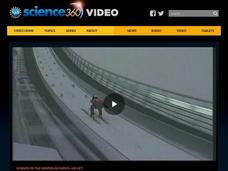Smithsonian Institution
Falling 101
Although gravity is something everyone experiences, many have misconceptions tied to the concept. A PD lesson from the Good Thinking series explores misconceptions and how to correct them. The lesson also offers ideas for demonstrations...
Physics Girl
The Physics of Weightless Flight
Ever wonder what it's like to feel weightless? Hop aboard the Vomit Comet and find out! A video from a large physics playlist features the parabolic airplane flight used to simulate weightlessness. Young physicists discover how the...
Physics Girl
The Physics Behind a Curveball - The Magnus Effect
Need to put a new spin on your motion lesson plan? Add a short video from an engaging physics playlist! Your class will get a kick out of examining the science behind a soccer curveball. Scholars discover how the movement of air at...
Physics Girl
How to Curve a Ball Backwards Using Science
That's the way the ball bounces ... or does it? An episode of a physics playlist examines the behavior of different types of balls when kicked. Learners experience the magnus effect as they watch while one ball curves to the...
Physics Girl
Fire in Freefall - Rare Physics Experiment
What happens when fire is less affected by gravity? Observe the behavior of fire in a fantastic freefall experiment! A video from the an engaging physics playlist explains the relationship between a flame's shape, buoyancy force, and...
National Science Foundation
Suit Up—Science of the Winter Olympics
You are what you wear! Learn the complex design strategies that result in the competition clothing seen in the Olympics. Scientists consider the requirement of each sport, which typically results in resisting air drag.
National Science Foundation
Air Lift—Science of the Winter Olympics
Up, up, and away! Young scholars learn how to apply physics to a successful ski jump. An interesting video lesson compares and contrasts drag and lift in the context of a ski jump.
National Science Foundation
Banking on Speed—Science of the Winter Olympics
Get on the right track! Young scholars learn about the importance of momentum and friction during a bobsled ride. A video lesson speaks to a bobsled designer to explain how he considers the physics during the design process.
Veritasium
Galileo the Scientific Parrot
Not all falling objects accelerate at the same rate ... unless you remove air resistance. A video lesson compares a feather falling in the air to one falling in a vacuum. Removing air resistance causes a feather and coin to fall at the...
Bozeman Science
Free Body Diagrams
How can you keep track of all the forces acting on an object? Pupils learn how to use a free body diagram to represent the forces acting on an object. After explaining the different forces, the instructor leads viewers through a series...
Crash Course Kids
Danger! Falling Objects
The rate at which an object falls to Earth is not completely based upon gravitational pull, but rather the air. This is the focus of a video that explains how air resistance and gravity work together.
PBS
Pbs Learning Media: Acids and Bases: Testing Rocket Cars
In this ZOOM video segment, cast members make bottle rocket cars using lemon juice and baking soda, and experiment with different ways of launching the cars. [4:46]
Khan Academy
Khan Academy: Impact Velocity From Given Height
Video tutorial shows how to determine how fast something will be traveling upon impact when it is released from a given height. [11:42]
Khan Academy
Khan Academy: Gravitation: Would a Brick or Feather Fall Faster?
Learn about whether a feather or a brick would fall faster on the moon in this video lecture. Understand how air resistance affects how objects fall to Earth. [10:34]
PBS
Pbs Learning Media: Good Thinking!: Falling 101
Watch this professional development video to help prepare lessons so that students can understand about gravity, inertia. and air resistance. [9:51]
Museum of Science
Ei E: Designing a Parachute
Students apply their knowledge of air resistance and aerospace engineering as they imagine, plan, create, test, and improve their own parachutes.
Museum of Science
Ei E: A Long Way Down: Designing Parachutes Lesson 3
Students learn about air resistance and test three isolated variables used in the design of parachutes. [11:42]
Museum of Science
Ei E: Designing a Parachute (2)
Students apply their knowledge of air resistance and aerospace engineering as they imagine, plan, create, test, and improve their own parachutes.
Museum of Science
Ei E: Designing a Parachute (1)
Students apply their knowledge of air resistance and aerospace engineering as they imagine, plan, create, test, and improve their own parachutes.
Museum of Science
Ei E: A Long Way Down: Designing Parachutes Lesson 3
Students learn about air resistance and test three isolated variables used in the design of parachutes. [14:52]
National Science Foundation
National Science Foundation: Science of Speed: Drag & Drafting
Engine power is constrained at superspeedways like Daytona and Talladega, so teams use aerodynamics to gain an advantage. Teams adjust their cars to minimize drag, but then it's up to the drivers to find 'the draft' and to trust the...
The Kid Should See This
Tksst: The Hammer Feather Drop in the World's Biggest Vacuum Chamber
Brian Cox visits NASA's Space Power Facility to demonstrate what happens when a bowling ball and a feather are dropped together under the conditions of space. [4:41]
Crash Course
Crash Course Kids 32.1: Danger! Falling Objects
In this episode of Crash Course Kids, Sabrina Cruz dempstrates that the rate at which things fall to Earth has to do with air resistance, and takes viewers on a trip to the moon. [3:32]
Crash Course
Crash Course Kids 32.2: Astronaut Experiment
In this episode of Crash Course Kids, the host does her own astronaut experiment to show us how to prove the existance of air resistance. [4:00]




















